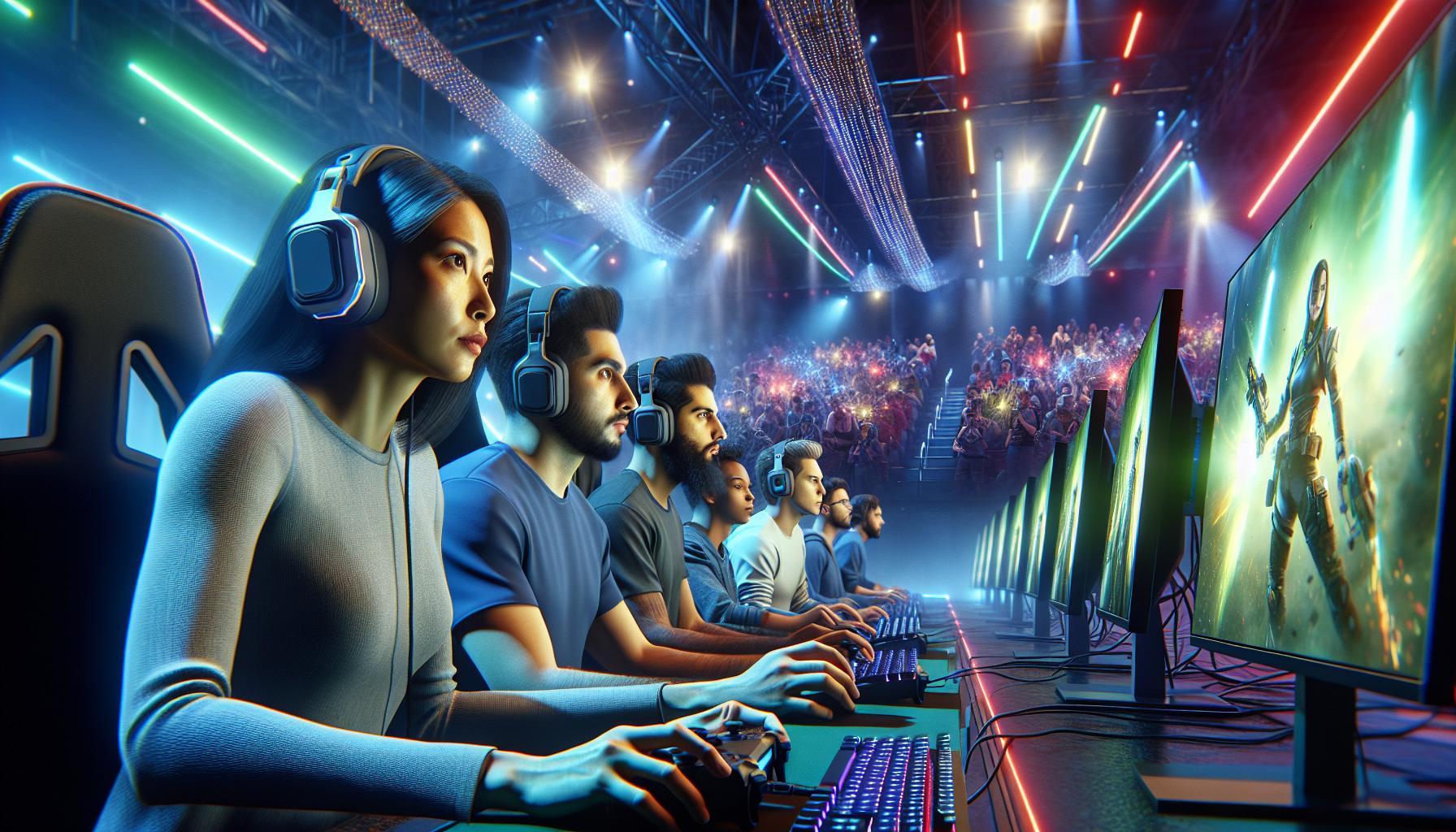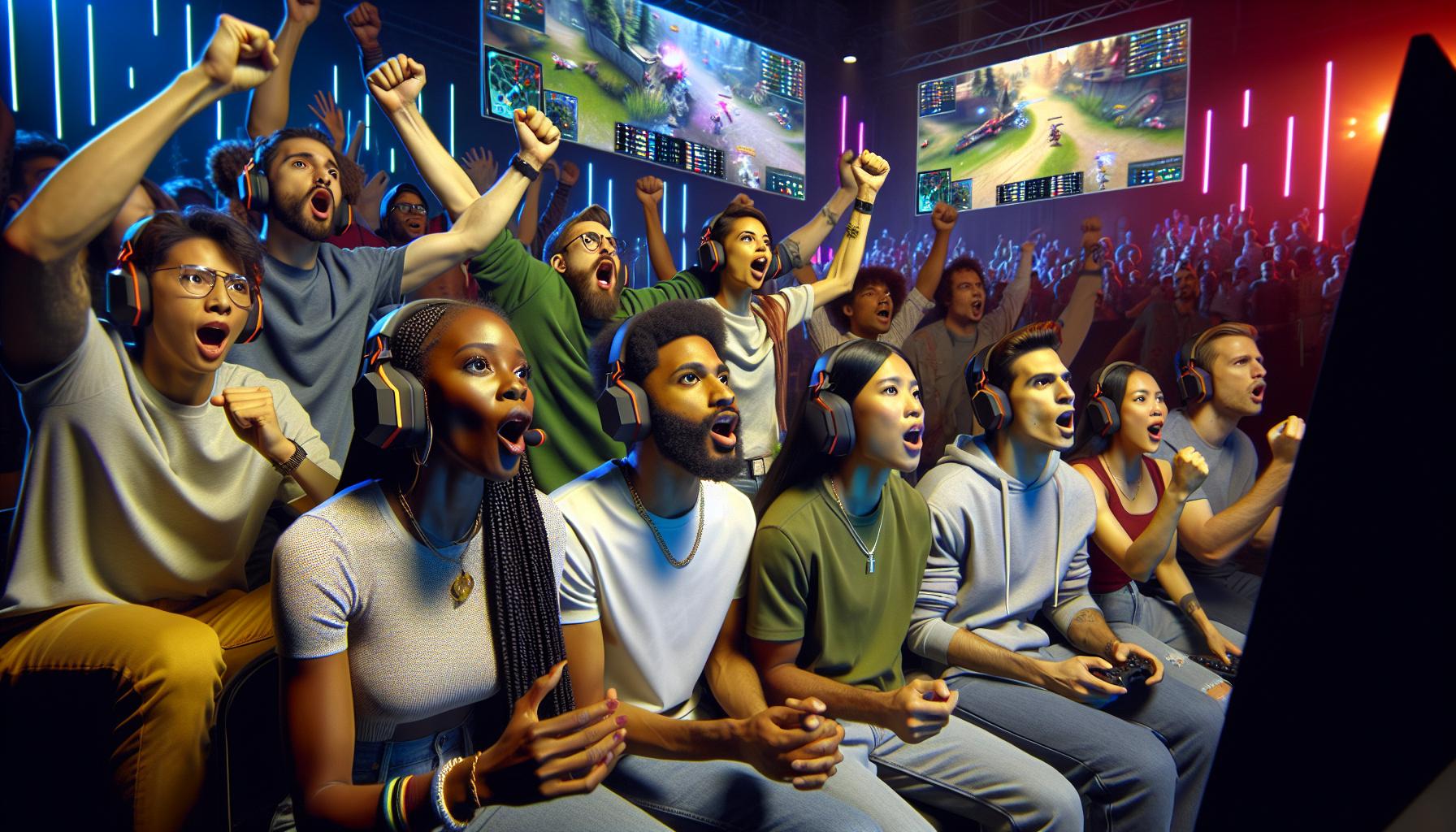
In a world where sitting on the couch with a controller in hand could lead to fame and fortune, esports and gaming have taken center stage. Gone are the days when video games were just a pastime; now they’re a billion-dollar industry that turns players into celebrities faster than you can say “Game Over.” Whether it’s cheering for your favorite team in a nail-biting tournament or perfecting that headshot in a first-person shooter, the thrill of competition keeps millions glued to their screens.
But it’s not just about the epic wins and losses. The gaming community is a vibrant tapestry of creativity, camaraderie, and occasionally questionable snack choices. As the lines between traditional sports and esports blur, it’s time to dive into this electrifying world where strategy, skill, and a little bit of luck can lead to glory. Get ready to explore the phenomenon that’s redefining entertainment as we know it.
Esports and Gaming
Esports encompasses competitive video gaming at professional levels, attracting millions of players and fans worldwide. The gaming industry generated over $200 billion in revenue in 2023, underscoring its massive economic impact. Players compete in tournaments for substantial prize pools, with some events offering over $30 million in rewards.
Gamers exhibit exceptional skills in popular titles such as League of Legends, Counter-Strike: Global Offensive, and Dota 2. These games serve as platforms for athleticism, strategy, and teamwork, often drawing significant online viewership. Online streaming platforms like Twitch and YouTube Gaming enable fans to watch live competitions and engage with their favorite players.
Tournaments frequently fill arenas, drawing crowds comparable to traditional sports events. These live events cultivate an electrifying atmosphere that fosters community interaction and loyalty among fans. This vibrant culture thrives on social media, where highlights, memes, and discussions spread rapidly.
Professional teams and organizations emerge regularly, reflecting the industry’s growth. Sponsorship deals from brands capitalize on this expanding audience, positioning esports alongside traditional sports in terms of marketability. The merging of esports and mainstream media brings increased visibility, with televised matches and collaborations with well-known sports organizations.
Community engagement becomes paramount, as gaming conventions and local tournaments foster connections among enthusiasts. These gatherings celebrate creativity, diversity, and shared interests, further solidifying the bond within the gaming community. Trackable metrics indicate continuous growth in player participation, revealing the industry’s potential longevity.
Esports and gaming cultivate an environment where individuals pursue careers as streamers, content creators, and professional players. The ongoing evolution of this sector indicates a promising future, where the lines between gaming and mainstream entertainment blur even more.
History of Esports

Esports has evolved significantly since its inception, influencing players and fans alike. The roots of competitive gaming trace back to early arcade games and home consoles.
Early Beginnings
Competitive gaming began in the early 1970s with the release of games like “Pong” and “Space Invaders.” The first documented tournament occurred at Stanford University in 1972, featuring “Spacewar!” Players competed for a year-long subscription to Rolling Stone magazine. Significant growth occurred in the 1980s with the rise of arcade culture. Titles like “Donkey Kong” and “Pac-Man” drew large crowds, laying the foundation for future tournaments. By the late 1990s, online gaming platforms began to take shape, creating an environment where players could compete directly from home.
Milestones in Esports Development
The 1997 release of “StarCraft” marked a pivotal moment for esports, garnering interest in Korea. The creation of the Korean e-Sports Association in 2000 formalized competitive gaming. Major titles like “Counter-Strike” and “Warcraft III” emerged, leading to the establishment of professional leagues and large prize pools. In 2010, the development of streaming platforms like Twitch transformed how audiences engaged with esports. High-profile tournaments, such as The International in 2011 for “Dota 2,” showcased multimillion-dollar prize pools. The explosion of mobile gaming in the 2010s further expanded esports participation, highlighting its diverse player base.
Popular Genres in Gaming

Gaming features a variety of genres, each attracting diverse player groups and offering unique experiences. The following genres exemplify the most popular categories in the gaming industry.
Action and Adventure Games
Action and adventure games combine intense gameplay with engaging narratives. Players control characters through immersive worlds, often facing a mix of combat, exploration, and puzzle-solving challenges. Titles like “The Legend of Zelda: Breath of the Wild” and “Assassin’s Creed” showcase vibrant environments, expansive storylines, and real-time combat mechanics. These games often appeal to those seeking both adrenaline-fueled action and rich storytelling experiences.
Strategy Games
In strategy games, players rely heavily on tactical decision-making and planning. This genre includes both real-time strategy (RTS) and turn-based strategy (TBS) games. Players command units, manage resources, and compete against opponents using strategic foresight. Popular games such as “StarCraft II” and “Civilization VI” highlight competitive multiplayer formats and intricate-level designs that require deep analytical skills and game knowledge. Engaging with peers in these environments fosters community through shared strategies and competitive play.
Sports Simulation Games
Sports simulation games replicate real-life sports experiences with a high degree of realism. Players assume control of teams or athletes, engaging in competitions that mirror their respective sports. Titles like “FIFA” and “NBA 2K” allow fans to experience the thrill of professional sports while also offering customization and career modes. These games appeal to sports enthusiasts by merging fan culture with interactive gameplay, creating a bridge between gaming and traditional sports.
The Impact of Esports on Society

Esports and gaming significantly influence society, creating vast economic opportunities and fostering community engagement. The implications of this phenomenon extend far beyond mere entertainment.
Economic Growth
Esports generates substantial revenue, contributing over $200 billion to the global gaming industry in 2023. Investments in professional teams, sponsorships, and merchandise drive this financial boom, drawing attention from major corporations. Notably, significant prize pools in tournaments, often exceeding $30 million, further attract players and fans. Cities hosting large events witness economic boosts through increased tourism and local spending. Additionally, the creation of jobs in various sectors—event management, marketing, and content creation—underscores the industry’s role in economic development. As esports continues to grow, its economic impact resonates across diverse industries.
Community and Social Interaction
Esports cultivates a vibrant community, uniting millions of fans through shared interests. Gaming conventions and local tournaments foster camaraderie, allowing fans to connect and celebrate their passions. Online platforms facilitate interaction, enabling players to form friendships and collaborations regardless of geographic location. Streaming services like Twitch amplify community engagement, allowing fans to support their favorite players and interact in real-time. These interactions enhance loyalty and connection within the gaming community. Furthermore, inclusivity is a hallmark of esports, welcoming diverse backgrounds and fostering a culture of acceptance and support among players. Such social dynamics contribute significantly to the overall appeal of competitive gaming.
Future Trends in Esports and Gaming
Esports and gaming constantly evolve, driven by advancements in technology and shifting player demographics.
Technological Innovations
Cutting-edge technology influences the future of esports and gaming. Cloud gaming reduces the necessity for expensive hardware, allowing players to access high-quality games on various devices. Virtual reality creates immersive experiences that enhance interaction during gameplay. Artificial intelligence improves gaming environments by offering intelligent NPCs and customizable challenges, elevating player engagement. Furthermore, mobile gaming continues to grow, appealing to those looking for on-the-go entertainment, with a revenue impact exceeding $100 billion in 2023. AR technologies expand possibilities, blending digital elements with the physical world to engage players in unique ways. These innovations collectively ensure the gaming industry’s trajectory aligns with modern consumer expectations.
Evolving Player Demographics
Diverse player demographics define the current landscape of esports and gaming. Female gamers now represent nearly 46% of the player base, showcasing increasing participation and influence in competitive scenes. The rise of younger players, particularly those aged 18 to 34, drives significant online engagement through platforms like Twitch and YouTube Gaming. Casual gamers make up a substantial portion of the market, enjoying inclusive experiences without the pressure of competition. Older generations, including those over 55, also contribute to gaming communities, challenging stereotypes about age and gaming. As demographics shift, developers increasingly prioritize accessibility and inclusivity, broadening appeal and fostering a stronger community.
Dynamic Force Within Entertainment And Culture
Esports and gaming have undeniably transformed into a dynamic force within entertainment and culture. The blend of competition and community has created a thriving ecosystem that attracts millions globally. As technology continues to advance and player demographics diversify, the future looks bright for this industry.
With increasing visibility and acceptance, esports is set to become an integral part of mainstream entertainment. The economic impact is profound and ongoing, fueling job creation and innovation. As players and fans unite over shared passions, the vibrant culture of gaming will only continue to flourish. The lines between traditional sports and esports are blurring, promising exciting developments ahead.
